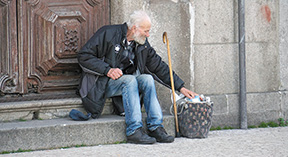
“Hola!” my newly minted eight-year-old daughter greets every passerby on the streets of Mexico City.
It’s the second morning of our family’s pilgrimage to the land of her namesake, and Teresa Guadalupe is eager to try out the Spanish vocabulary words she’s been memorizing in preparation for the journey.
Teresa is a girl after my own heart, a lover and a fighter. Today, she’s mostly a lover. “Hola!” she continues.
The city is bustling this morning, necessitating rapid-fire greetings. “Hola! Hola! Hola!”
Some morning commuters ignore her. Others smile. A militarized police officer watches amusedly from the back of a jeep, holding a machine gun with one hand and eating a sandwich with the other.
We, too, are looking for breakfast, so we head toward the corner bakery Teresa spotted on our walk around the neighborhood.
My two-decades-out-of-practice high school Spanish isn’t much better than
Teresa’s, but it’s enough to help us procure some pan dulce — Mexican sweetbread — to begin our day.
We start back toward the home we’ve rented for the week when a faint cry draws my attention.
It’s a beggar sitting on the sidewalk just outside the bakery. The man holds out his hand for alms.
Inwardly, I’m annoyed. If I had just kept walking, I would have been able to avoid the man. But now we’ve made eye contact. It’s too late to dodge him. My conscience won’t let me. So I sigh, shrug my shoulders, and fish a peso or two from my pocket.
It’s the least I can do. It is quite literally the very least I can do, as it will not fill the man’s belly for even one meal.
My faux-generosity accomplishes nothing — except perhaps to delude myself into believing I’m a caring person.
But while I can lie to myself, the Lord will not be fooled. Nor will He let me off the hook.
Just before we cross the street toward our apartment, I turn back and this time see not a nuisance, but a man.
The type of man my daughter’s other namesake — a diminutive Nun from Calcutta, India — once described as “Jesus in the distressing disguise of the poor.”
Skinny, weak, and looking more than a little dazed, only the absence of dogs licking the man’s sores distinguishes him from Lazarus.
What, I wonder, distinguishes me from the rich man who lifted not a finger to help poor Lazarus? If anything, the rich man compared favorably.
At least he didn’t try to bribe his own conscience with nothing more than a couple of pesos.
“My name is Steve,” I piece together in broken Spanish. “What is your name?”
“David,” he replies.
“David, do you want something to eat?” He nods, and we re-enter the bakery together. David picks out something for breakfast and something to save for later, I pay, and we wish him well.
The pan dulce is so delicious that we return the next day.
David is sitting outside the bakery again, so we greet him and buy him breakfast again.
This time, I introduce my children. “Hola!” Teresa gleefully addresses him.
David says little. What he does say is hard to understand — and it’s not just the language barrier. He is barely able to communicate even in his native tongue. Perhaps he has some intellectual disability.
But day after day, we see him and make sure he has something to eat.
“Daddy, how come Mr. David doesn’t have a home?” Teresa and her sister Katherine ask one day.
“I don’t know, sweethearts,” I reply. But I share my suspicion: “Maybe something in his brain doesn’t work quite right, so he can’t get a job to make money.”
Teresa’s reaction takes me aback. “So he’s like me!” she cries with joy.
You see, Teresa has recently been diagnosed with dyslexia. Sounding out words and stringing together the sentences in her library books is a struggle, a painful one. But today, it’s a bond.
I marvel. Even in my attempt at charity, I look at David and see our differences: I have a job and a family and a roof over my head. He has none.
But my daughter — my sweet, wonderful daughter — looks upon this hungry, weathered, homeless beggar covered in all the grime of a nine-million-resident city and sees first and foremost what they have in common.
It’s now our last day in Mexico. This morning, David has a nasty cut over his right eye.
“What happened?” I think to myself — about both David’s gash and his life.
Surely, he once had a mother who loved him with her whole heart the same way I love Teresa and her siblings. Where did things go wrong? My heart breaks.
This last visit is bittersweet. After sharing one final breakfast, I tell David that we’re going back home and won’t see him again. He appears to understand and nods. I promise to pray for him.
A year and a half later, I still do pray for David — though not as often as I should. I wonder about him too. Where is he now? Is he still alive? Is there another soul in this world who even knows his name?
I know that I will never see David again in this life. I hope I get to see him in the next.
And if I do somehow make it to Heaven, I am confident that it will be at least in part because David — a man by all appearances without purpose or mission or anything to offer the world whatsoever — provided me with the most priceless of treasures: an opportunity to recognize Jesus Christ in the least of His brethren.
So when I meet David again, I know just how I’ll greet him: “Hola!”
Steve Karlen is a husband and father of five. He and his family live in Fitchburg.

